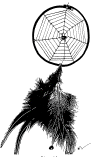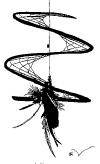The Soul of the Indian
Eastman, Charles Alexander (1911)
The Indian loved to come into sympathy and spiritual
communion with his brothers of the animal kingdom, whose inarticulate souls
had for him something of the sinless purity that we attribute to the
innocent and irresponsible child. He had faith in their instincts, as in a
mysterious wisdom given from above; and while he humbly accepted the
supposedly voluntary sacrifice of their bodies to preserve his own, he paid
homage to their spirits in prescribed prayers and offerings.
In every religion there is an element of the supernatural,
varying with the influence of pure reason over its devotees. The Indian was
a logical and clear thinker upon matters within the scope of his
understanding, but he had not yet charted the vast field of nature or
expressed her wonders in terms of science. With his limited knowledge of
cause and effect, he saw miracles on every hand, -- the miracle of life in
seed and egg, the miracle of death in lightning flash and in the swelling
deep! Nothing of the marvelous could astonish him; as that a beast should
speak, or the sun stand still. The virgin birth would appear scarcely more
miraculous than is the birth of every child that comes into the world, or
the miracle of the loaves and fishes excite more wonder than the harvest
that springs from a single ear of corn.
Who may condemn his superstition? Surely not the devout
Catholic even Protestant missionary, who teaches Bible miracles as literal
fact! The logical man must either deny all miracles or none, and our
American Indian myths and hero stories are perhaps, in themselves, quite as
credible as those of the Hebrews of old. If we are of the modern type of
mind, that sees in natural law a majesty and grandeur far more impressive
than any solitary infraction of it could possibly be, let us not forget
that, after all, science has not explained everything. We have still to face
the ultimate miracle, -- the origin and principle of life! Here is the
supreme mystery that is the essence of worship, without which there can be
no religion, and in the presence of this mystery our attitude cannot be very
unlike that of the natural philosopher, who beholds with awe the Divine in
all creation.
It is simple truth that the Indian did not, so long as his
native philosophy held sway over his mind, either envy or desire to imitate
the splendid achievements of the white man. In his own thought he rose
superior to them! He scorned them, even as a lofty spirit absorbed in its
stern task rejects the soft beds, the luxurious food, the
pleasure-worshiping dalliance of a rich neighbor was clear to him that
virtue and happiness are independent of these things, if not incompatible
with them.
There was undoubtedly much in primitive Christianity to
appeal to this man, and Jesus' hard sayings to the rich and about the rich
would have been entirely comprehensible to him. Yet the religion that is
preached in our churches and practiced by our congregations, with its
element of display and self-aggrandizement, its active proselytism, and its
open contempt of all religions but its own, was for a long time extremely
repellent. To his simple mind, the professionalism of the pulpit, the paid
exhorter, the moneyed church, was an unspiritual and unedifying, and it was
not until his spirit was broken and his moral and physical constitution
undermined by trade, conquest, and strong drink, that Christian missionaries
obtained any real hold upon him. Strange as it may seem, it is true that the
proud pagan in his secret soul despised the good men who came to convert and
to enlighten him!
Nor were its publicity and its Phariseeism the only
elements in the alien religion that offended the red man. To him, it
appeared shocking and almost incredible that there were among this people
who claimed superiority many irreligious, who did not even pretend to
profess the national. Not only did they not profess it, but they stooped so
low as to insult their God with profane and sacrilegious speech! In our own
tongue His name was not spoken aloud, even with utmost reverence, much less
lightly or irreverently.
More than this, even in those white men who professed
religion we found much inconsistency of conduct. They spoke much of
spiritual things, while seeking only the material. They bought and sold
everything, labor, personal independence, the love of woman, and even the
ministrations of their holy faith! The lust for money, power, and conquest
so characteristic of the Anglo-Saxon race did not escape moral condemnation
at the hands of his untutored judge, nor did he fail to contrast this
conspicuous trait of the dominant race with the spirit of the meek and lowly
Jesus.
He might in time come to recognize that the drunkards and
licentious among white men, with whom he too frequently came in contact,
were condemned by the white man's religion as well, and must not be held to
discredit it. But it was not so easy to overlook or to excuse national bad
faith. When distinguished emissaries from the Father at Washington, some of
them ministers of the gospel and even bishops, came to the Indian nations,
and pledged to them in solemn treaty the national honor, with prayer and
mention of their God; and when such treaties, so made, were promptly and
shamelessly broken, is it strange that the action should arouse not only
anger, but contempt? The historians of the white race admit that the Indian
was never the first to repudiate his oath.
It is my personal belief, after thirty-five years'
experience of it, that there is no such thing as "Christian Civilization." I
believe that Christianity and modern civilization are opposed and
irreconcilable, and that the spirit of Christianity and of our ancient
religion is essentially the same.
THE GREAT MYSTERY -
2
THE FAMILY ALTAR -
2
CEREMONIAL AND SYMBOLIC WORSHIP
-
2
BARBARISM AND THE MORAL CODE
-
2
UNWRITTEN SCRIPTURES
-
2
ON THE BORDERLAND OF SPIRITS
-
2
White Eagle Soaring: Dream Dancer of the 7th Fire







 Get
a course to promote your business online, explode your sales
Get
a course to promote your business online, explode your sales Get
software to promote your business online in less time
Get
software to promote your business online in less time Get
software to streamline your business and run it hands free.
Get
software to streamline your business and run it hands free.